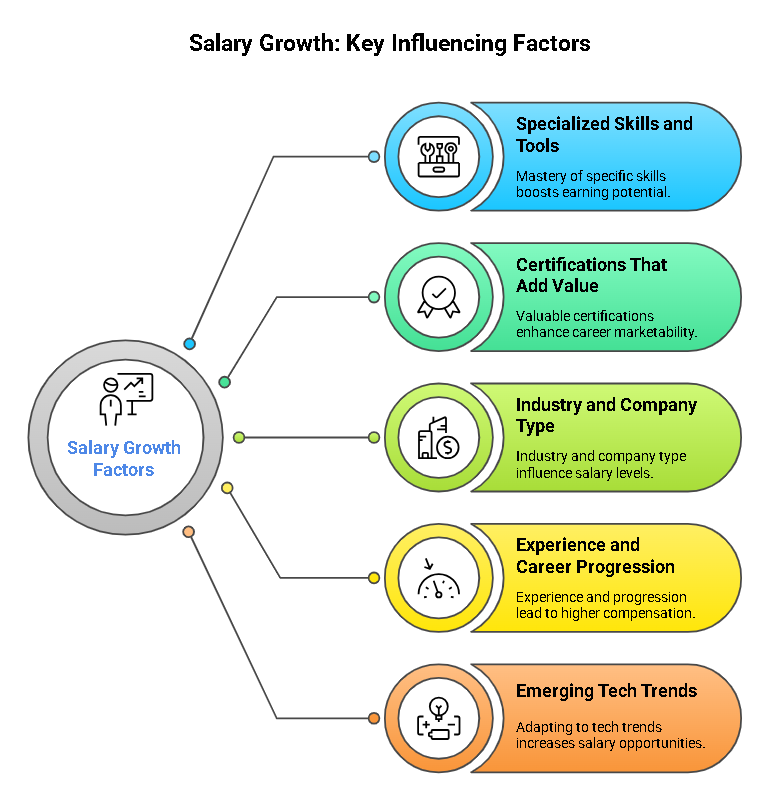Imagine two people standing at the same crossroads: one building the highways for data to travel, the other driving insights down those roads to help businesses make smart moves. Both are valuable, but their paychecks? That’s where things get interesting.
Data analysts and data engineers may work with the same raw material—data—but their roles, responsibilities, and salaries in 2025 tell two very different stories. This guide cuts through the noise and shows you exactly how much each role earns, what factors raise the numbers, and how to pick the career that fits your skills and goals.
Understanding the Roles Before Comparing Salaries
Before diving into salaries, it’s helpful to understand what each role actually entails. Data analysts and data engineers work closely with the same data but in very different ways—and that difference explains much of the pay gap.
What Does a Data Analyst Do?
A data analyst turns raw data into clear, actionable insights. They collect information from various sources, clean it, and analyze it to identify trends and patterns. Then, they share those findings through reports, charts, and dashboards that help teams make smarter decisions.
They typically work with tools like SQL, Excel, Power BI, Tableau, or basic Python/R to crunch numbers and visualize results. A marketing team might rely on a data analyst to show which campaigns are working best, while a sales team may need them to find what drives customer purchases.
What Does a Data Engineer Do?
If a data analyst is the driver, a data engineer builds the roads. They design and maintain the systems that store and move data, making sure it’s accurate, accessible, and fast to process.
Data engineers often work with Python, Java, SQL, cloud platforms (AWS, Azure, GCP), and big data tools like Hadoop or Spark. Their work ensures analysts, data scientists, and business leaders always have clean, organized data at their fingertips.
Why the Distinction Matters for Salary Comparisons
The difference between these roles isn’t just about tools—it’s about scope and impact. Data analysts help answer business questions; data engineers make sure the data exists in the first place. Because engineers handle complex systems and infrastructure, their work often commands higher pay, especially as companies collect and process larger volumes of data.
Average Salaries in 2025: Data Analyst vs Data Engineer
Salary differences between data analysts and data engineers come into focus when we look at the numbers. Below is a breakdown by experience, industry, and location so you can see where the biggest gaps appear.
National Salary Averages
In 2025, data engineers typically earn more than data analysts across most experience levels because of their technical scope and infrastructure responsibilities.
- Data Analyst:
- Entry-level: $55,000–$72,000/year
- Mid-level: $73,000–$95,000/year
- Senior-level: $96,000–$120,000+/year
- Data Engineer:
- Entry-level: $80,000–$110,000/year
- Mid-level: $111,000–$140,000/year
- Senior-level: $141,000–$170,000+/year
Hourly rates: Analysts often earn $25–$50/hour, while engineers command $40–$80/hour depending on skills and project complexity.
Salary by Experience Level
Pay scales climb quickly with experience for both roles, but the gap widens as engineers move into senior and architect-level positions.
- Entry-Level (0–2 years): Analysts start lower because companies expect them to learn on the job, while engineers require stronger technical foundations.
- Mid-Level (3–5 years): Both see significant jumps, especially if they pick up advanced tools or certifications.
- Senior-Level (5+ years): Engineers often move into data architecture or leadership roles with much higher pay ceilings than senior analysts.
Salary by Industry
Industry choice plays a major role in earning potential:
- Finance & FinTech: Often, the highest salaries for both roles are due to strict data requirements.
- Tech & SaaS: Competitive pay and stock options attract top engineering talent.
- Healthcare & Pharma: High demand for compliance-ready data skills.
- E-commerce & Retail: Data analysts thrive here with customer and sales insights.
Example: A senior data engineer in tech may earn $170K+, while a senior analyst in healthcare might earn $120K–$130K.
Salary by Location
Where you work matters:
- Highest-paying U.S. cities: San Francisco, Seattle, New York City, Austin, and Boston.
- Remote roles: Growing fast in 2025, often offering 10–20% less pay but better flexibility.
- On-site roles in tech hubs: Still pay a premium for local talent, especially for engineering roles with niche skills.
Factors That Influence Salary Growth

Beyond location and experience, several factors directly impact how much a data analyst or data engineer earns. Here are five key drivers shaping salaries in 2025: These include the level of technical proficiency in programming languages, demand for specialized skills such as machine learning or big data technologies, and the size and industry of the employer. As firms increasingly recognize the value of data-driven decision-making, the data analyst salary comparison 2025 will reflect the growing competition for top talent, further driving up compensation packages. Additionally, geographic trends will influence these salaries, with urban tech hubs likely offering the highest pay rates.
1. Specialized Skills and Tools
Mastery of in-demand tools and programming languages can push salaries higher. For analysts, this might include advanced SQL, Tableau, or Python. For engineers, cloud platforms like AWS or Azure, big data frameworks like Spark, and modern ETL tools often bring bigger paychecks.
2. Certifications That Add Value
Professional certifications signal advanced knowledge and often lead to salary bumps. Examples include:
- AWS Certified Data Analytics
- Google Cloud Professional Data Engineer
- Microsoft Power BI or Azure Data Engineer
- Databricks certifications for big data engineering
3. Industry and Company Type
High-paying industries like finance, tech, and healthcare tend to offer more competitive salaries than nonprofits or small startups. Similarly, consulting firms often pay well but may come with demanding workloads, while product companies provide stability and growth potential.
4. Experience and Career Progression
Salaries naturally rise as professionals move from entry-level to senior roles, but engineers often have a steeper growth curve due to leadership or architecture positions that analysts may not reach without switching roles.
5. Emerging Tech Trends
Skills in AI, machine learning, real-time analytics, and cloud-native data solutions are rapidly becoming premium. Employers pay more for professionals who can keep up with modern data infrastructure and automation demands.
Career Growth and Long-Term Earning Potential
Salary growth doesn’t stop at the first job offer. Both data analysts and data engineers have multiple paths to advance their careers and significantly increase their earning potential over time.
Typical Career Path for Data Analysts
A data analyst often starts with reporting and visualization work but can move into more strategic roles:
- Data Analyst → Senior Analyst → Analytics Manager → Data Scientist / BI Lead
- Salaries rise with responsibilities such as managing teams, influencing strategy, and working with advanced analytics or machine learning tools.
- Transitioning into data science or business intelligence leadership often brings the highest pay within the analyst career track.
Typical Career Path for Data Engineers
Data engineers have a strong technical foundation, leading to roles with higher complexity and pay:
- Data Engineer → Senior Engineer → Data Architect → Engineering Manager / Cloud Architect
- Senior engineers and architects often lead system design, cloud infrastructure, and enterprise-level data strategy, all of which come with higher salaries.
Switching Between Roles
Many professionals start as data analysts and transition to data engineering after learning programming, cloud tools, or database management. This switch can result in significant pay increases because engineering roles tend to have higher ceilings.
Why Engineers Often Out-Earn Analysts Long-Term
As companies grow more data-driven, they need scalable infrastructure. Engineers building these systems handle complexity and high-impact decisions, often leading to architect or leadership roles with six-figure salaries that surpass most analyst positions.
Which Career Pays More in 2025?
When comparing salaries side by side, data engineers generally out-earn data analysts at every stage—from entry-level roles to senior positions. The main reasons are:
- Technical complexity: Engineers build and maintain the infrastructure behind analytics, requiring stronger programming and cloud expertise.
- Business impact: Reliable data systems affect the entire organization, making engineers essential for scaling operations.
- Career ceiling: Senior engineering roles, like data architects or cloud engineering managers, command salaries far above analyst roles unless analysts move into data science or leadership tracks.
However, analysts in niche industries—like finance or biotech—or those who transition into data science or analytics leadership roles can sometimes close the gap or even surpass engineering salaries.
In most cases, though, data engineering offers a higher earning potential for professionals who want to stay close to the technical side of data.
Conclusion
Both data analysts and data engineers play essential roles in turning raw information into business results, but the pay gap in 2025 comes down to skills, technical depth, and career paths.
If you want higher starting pay and long-term earning potential, data engineering is usually the better bet—especially if you enjoy building systems, working with cloud platforms, and solving complex technical problems.
On the other hand, data analysis offers a faster entry point into the data field, strong salaries in industries like finance or healthcare, and the chance to move into leadership or data science roles if you want to close the pay gap later.
Either path can lead to six-figure salaries with the right skills, certifications, and industry focus. The best choice depends on your interests—whether you want to build the data highways or drive insights down them to shape big business decisions.




